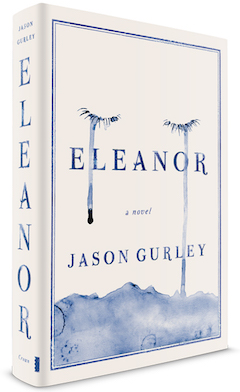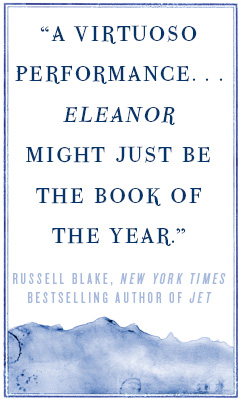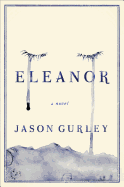Eleanor
by Jason Gurley
Although readers who stick to titles from well-known publishing houses may not recognize Jason Gurley's name yet, anyone who follows the world of self-published titles will probably nod "of course" when hearing that a traditional publisher enthusiastically acquired one of his own releases. After making a name for himself with his Greatfall series, set in the world of Hugh Howey's Wool, Gurley published a story about a girl called Eleanor that quickly generated buzz among readers. Conceived and created over the course of more than a decade, his fantasy story had the bones of a family drama with a dash of young adult genre in the mix as well. Now a much wider audience is about to discover this categorization-defying adventure.
In 1963, Eleanor lost a promising career as a competitive swimmer when she married an older man and quickly got pregnant with a daughter. Despite her husband's support, returning to her Olympic dreams as the mother of a toddler turned into an unrealistic goal. Struggling with her own unsuitability to domestic life, she became desperate enough during her second pregnancy to swim out to sea and never return.
In 1985, another Eleanor, granddaughter of the first, lost her twin sister, Esme, in a car crash at the age of six.
In the early 1990s, the now-teenaged Eleanor lives in the shadow of her sister's ghost, her family irrevocably unwound by Esme's death. Her mother, Agnes, the driver in the fatal accident, drinks away the days and spews a constant stream of vitriol at Eleanor for serving as a living reminder of Esme. Although life with her father, Paul, who divorced her mother in the aftermath of Esme's death, might have more normalcy, Eleanor feels obligated to take care of Agnes. The only brightness in her life comes from her longtime friend Jack, the one person she can trust.
In a different but intersecting world, two entities called Mea and Efah watch Eleanor. More than anything, Mea wants to pull Eleanor into her world. Mea hates to trust Efah, who wants to control her, but he promises to teach her how to bring Eleanor close to them. When Mea's early attempts fall short of their mark, Eleanor suddenly finds herself yanked out of her reality and into bizarre new realms. She watches younger versions of herself and Jack playing with fireworks, "painting elegant curls and spirals in the dusk with their sparklers." She tumbles naked into a miserable gray valley where "the clouds lumber by, underbellies black like those of automobiles." Although she's afraid to tell anyone about her experiences, Eleanor knows she is not hallucinating--not when she returns from these visions with different hair and clothing, not when her returns happen violently enough to send her to the hospital. Mea can only rage in frustration and try again, hoping the next time will bring Eleanor to her, hoping her attempts will not kill Eleanor. As she is torn from our reality again and again, Eleanor travels unknowingly closer to the pain eating away at her shattered family.
Ethereal prose and off-kilter fantasy worlds wait around every bend as Eleanor gets caught up in forces beyond her ken and control. Gurley flings genre boundaries to the wind and finds his own way through the intertwined threads of trauma, magic and love. The story's refusal to slip into easy categorization keeps the reader in a state of surprise; while we have seen the elements before, we have not necessarily seen them meshed in this way. Fantasy and drama lean on and feed into each other seamlessly, whipping Eleanor and everyone around her back and forth like windsocks. The chaotic overtones of the alternate worlds Eleanor falls into echo in her real-world existence where she cares for her mother instead of the other way around, where she "is her own psychologist." Although little time is spent explaining the mechanics of her movements in and out of our world, the asymmetry of the other realms fits so well with Eleanor's life that suspending disbelief takes little exertion.
However, Gurley's greatest strength is arguably his knack for writing his characters as people, not constructs. The reader never sees the writer's hand manipulating characters' actions to fit into the plot; rather, their reactions guide the storyline and feel completely organic. Teenage Eleanor's transition from a victim of paranormal circumstance to a champion brave enough to risk everything for her family must have taken Gurley considerable time and careful building, yet it reads as though undertaken effortlessly. Even hints of a possible romance between Jack and Eleanor dodge the trap of stereotypical teen angst; instead of yearning, Eleanor feels an inability to yearn. Gurley consistently demonstrates a deep understanding of how the actions of a parent can impact a child's entire future and continue to resonate through generations, both through the inner lives of characters and the nightmarish ecosystem Mea inhabits and Eleanor visits. By turns adventurous and contemplative but always heartfelt, Gurley's first foray into major publishing will surely not be his last. --Jaclyn Fulwood








